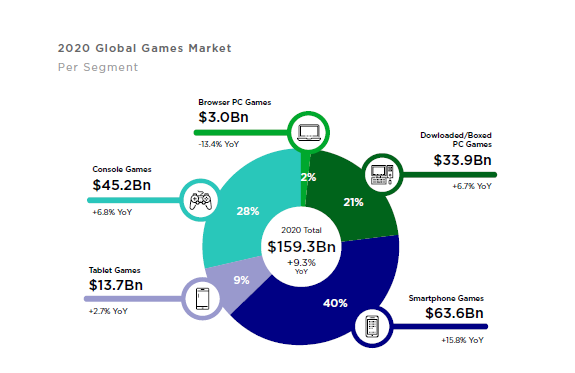eSports are booming
With the coronavirus pandemic sweeping the globe and people confined to their homes in many nations, the world is experiencing an electronic sports and video gaming boom. Australian investors now have the opportunity to enter the game.
Few of us actually realise how big and potentially lucrative this business is.
It is now larger than both the movie and music industries combined. Consider the largest grossing movie of all time, Avengers: Endgame. When it premiered in April 2019, it raked in over $US858 million ($1.2 billion) during its opening weekend. This easily underperforms the highest-grossing entertainment launch in history: Grand Theft Auto V's release in 2013, which earned $US1 billion in just three days.
It has been estimated that the global video games market will generate revenues of $US159.3 billion in 2020, a 9.3% year-on-year increase. By 2023 the market is expected to grow to $US200.8 billion, expanding at 7.7% compound annual growth rate (CAGR) from 2018 and reaching the $US200 billion milestone by the end of 2023.
Those forecasts could be modest. With millions of people confined to their homes now and into the foreseeable future, electronic sports and interactive video gaming are becoming an important form of home entertainment. They're keeping many of us sane at a time when we most need it.
And the numbers of people gaming and tuning in are overwhelming. As at the end of July 2020, there were more people gaming, at 2.7 billion, than Facebook subscribers (estimated at 2.5 billion) or watching Netflix (190 million subscribers). Esports and video game engagement metrics have been setting records across several platforms, including broadcast TV, online viewership of gaming and player numbers.
In 2019 esports drew a global audience of 443 million viewers. That was more than American football and international rugby union combined, at 410 million viewers.
The 2019 Fortnite World Cup was one of the biggest esports tournaments, with over 2.3 million viewers watching the solo finals across YouTube and Twitch. Fortnite has the highest annual revenues from any video game in history. And it's free to play.
Even Australia's Monash University has entered the game and is nurturing the next generation of gamers through its elite student performer scheme (ESPS). It recently announced that the program will extend to students who compete or perform in esports at an elite level. This recognition of esports in a program aimed at traditional sports reflects the changing times among our academic institutions.
The spike in gaming during the pandemic is simply an acceleration of trends that have been under way for several years. Interestingly, almost half of all game enthusiasts are now female, according to Newzoo, the global authority on the video gaming industry. This counters the stereotype that gamers are mostly male.
Driving much of this growth has been the transition from gaming at home, often a solo activity, to a group-play scenario where people can play games anywhere and with anyone. Electronic sports, too, have been similarly propelled by internet technologies and expanding bandwidth.
In terms of how where we game, the smartphone segment is the biggest, followed by consoles. But with advancements in 5G and internet technologies - currently being rolled out in Australia and globally - this could accelerate mobile growth as it will allow more sophisticated games to be played on handheld devices.
Source: Source: 2020 Global Games Market Report, Newzoo. 2020 numbers are projected. Figures are in US dollars.
The long-term drivers that will underpin future growth are a younger demographic, with a generational shift towards online video gaming over more traditional social platforms. Technological innovation too is important. Advances in artificial intelligence and the digitisation have pushed video gaming into the mainstream and it's disrupting traditional entertainment channels.
In an Australian first, VanEck has recently announced it is launching the VanEck Vectors Video Gaming and eSports ETF (ASX: ESPO), allowing investors to tap into the mega trend of technology but diversify away from the FAANGs.
ESPO's holdings include leading game publishers Tencent, Nintendo, Electronic Arts and Activision Blizzard. It will also invest in related software developers, streaming services and companies involved in esports events. The ETF is expected to commence trading on the ASX in coming weeks.
This article was originally published in Money.
Published: 03 September 2020
Issued by VanEck Investments Limited ACN 146 596 116 AFSL 416755. This is general information only and not personal financial advice. All investments have risks. Performance is not guaranteed. Read the PDS at www.vaneck.com.au and speak to a financial adviser about whether ESPO is right for you.



